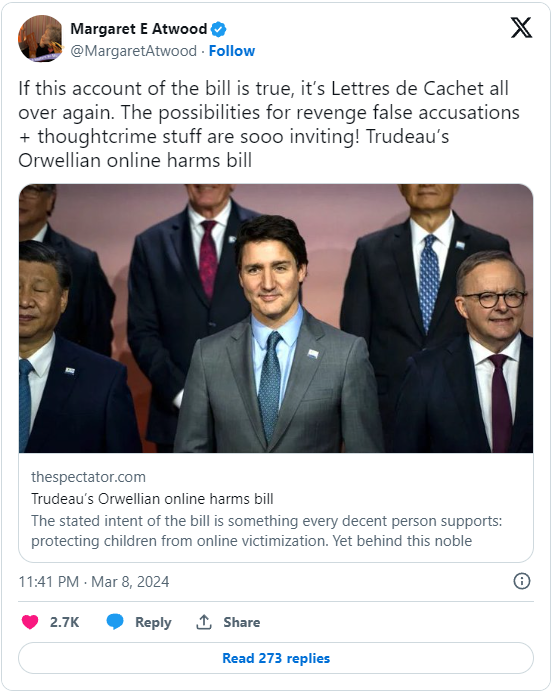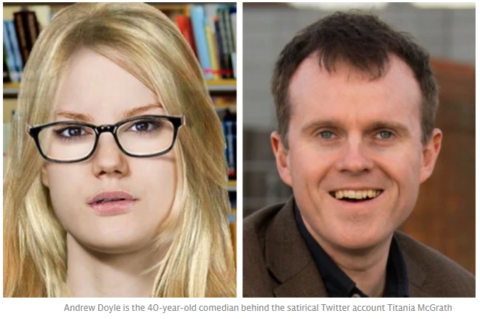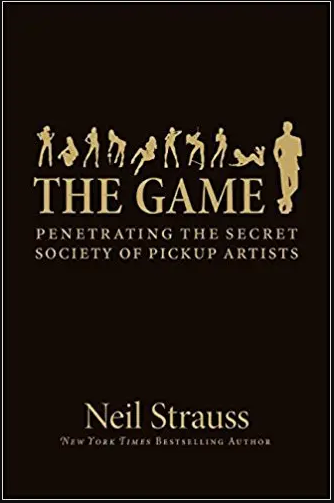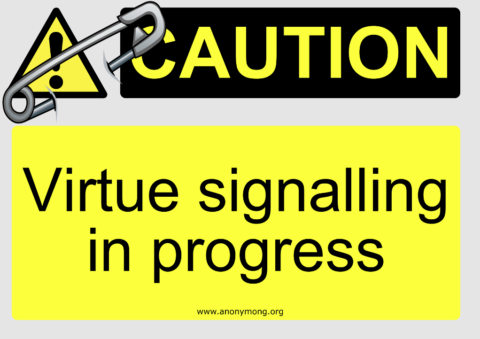Meanwhile, the Worldwide Sisterhood Against Terrorism And War, which includes Susan Sarandon, Gloria Steinem, Alice Walker and about 75 other sisters and is “Worldwide” mainly in the sense the World Series is, organized a petition called “Not In Our Name”. “We will not support the bombing,” they declared, and who can blame them? I dropped out of women’s studies in Grade Two, but, as I recall, a bombing campaign is a quintessential act of patriarchal oppression and sexual domination. The male pilot, looming over the curvy undulating form of the Third World hillside, unzips his bomb carriage and unleashes his phallic ordinance to penetrate his target. Needless to say, he explodes on contact, typical bloody men.
Mark Steyn, “Omar’s Girls”, National Post, 2001-11-29.
March 19, 2024
QotD: “Not In Our Name”
March 18, 2024
QotD: Self-hatred (aka “false consciousness”)
The expectation that a commentator’s views must be in lockstep with his or her ethnic, religious, or sexual identity is always distasteful — particularly when blacks, women, gays, or Jews are labeled “self-hating” when they refuse to toe the perceived party line.
Cathy Young, “When Jews wax anti-Semitic”, Boston Globe, 2005-02-07.
March 17, 2024
Problematic art, again
David Thompson calls to our attention yet another outbreak of problematic racist white supremacy in … landscape paintings?
Above, John Constable’s Hampstead Heath, circa 1820. Beware its morally corrupting influence.
The problem, we’re told, is that paintings from the eighteenth and nineteenth centuries are “leaving very little room for representations of people of colour”. And obviously, even the past must be made “inclusive and representative”. Which seems to mean that we must all pretend that our islands’ population and cultural assumptions have always looked like those of, say, twenty-first century London, a city whose demographics bear little relationship to those of the country as a whole, even in the twenty-first century.
It occurs to me that notions of racial “representation” will likely be distorted by the embrace of rather parochial progressive conceits, and by proximity to the nation’s capital, which in my lifetime has gone from a native white-majority city, over 90%, to a native white-minority one, around 35%, and which is wildly out of step with the rest of the nation. Things that are denounced as “horribly white”, or whatever the current term of disapproval is, may not seem so to people who live in, say, Chesterfield or Plymouth.
But apparently, museum visitors must be warned that the sight of a Constable landscape may trigger TERRIFYING BLOOD AND SOIL TENDENCIES. Or at least inspire thoughts of historical attachment, continuity, and belonging – thoughts that may be disconcerting or very much frowned upon, if only by the – wait for it – keepers of our heritage.
March 15, 2024
Woke Shakespeare?
Andrew Doyle wonders if even the Bard can survive the incessant assaults of the ultra woke, the new Puritans:

This was long thought to be the only portrait of William Shakespeare that had any claim to have been painted from life, until another possible life portrait, the Cobbe portrait, was revealed in 2009. The portrait is known as the “Chandos portrait” after a previous owner, James Brydges, 1st Duke of Chandos. It was the first portrait to be acquired by the National Portrait Gallery in 1856. The artist may be by a painter called John Taylor who was an important member of the Painter-Stainers’ Company.
National Portrait Gallery image via Wikimedia Commons.
The puritans had it in for Shakespeare. With the exception of the plague, they were perhaps the most persistent threat to his livelihood. As far as these zealots were concerned, the theatre was a realm of “adulterers, adulteresses, whoremasters, whores, bawds, panders, ruffians, roarers, drunkards, prodigals, cheaters, idle, infamous, base, profane, and godless persons”.
These were the words of the polemicist William Prynne from his Histrio-Mastix (1633). He was eventually to get his way in 1642 when the puritan-led parliament shut the theatres down. When the ban was lifted on the accession of Charles II, older plays had to be dusted off to satisfy the public’s appetite for drama. It was Shakespeare’s work that proved to be the most popular, establishing a trend that has never waned.
Now the bard faces another breed of puritan, more censorial than the last. We are living in conformist times, and inexplicably those in the creative arts have turned out to the be most conformist of all. Nowhere is this more evident than the theatre industry, where wrongthink is outlawed and artistic freedom is sacrificed on the altar of identity politics. Virtually all productions of Shakespeare’s plays I have seen in recent years have been mangled to promote the regressive fashions of our time. Today’s audiences are seeing a vague shadow of these masterworks through a narrow and uninspiring prism.
Even so, many of us are reluctant to give up on the theatre altogether. We tolerate the gender-neutral toilets that nobody asked for, the rainbow lanyards worn by ushers, and the little sermons in the programmes by directors who think their job is to educate the masses. One friend remarked that so long as the preaching only amounts to 20% of the show’s content, he is willing to accept it. I suppose it’s like going for dinner in an especially pious household, and having to put up with a long-winded prayer before a delicious meal.
Theatregoers might have a better experience if they opt for productions of plays written many years before this new state religion took hold. Shakespeare, as a playwright who has never been bettered, is surely the safest choice. In his work we find ourselves unmolested by ideology. We know nothing of Shakespeare’s opinions on matters of politics or religion, and attempting to glean any suggestions from his works is futile. I think A. L. Rowse put it best when he pointed out that Shakespeare “saw through everybody equally”. Neither prince nor pauper escapes his sceptical gaze.
March 14, 2024
The insane pursuit of a “zero waste economy”
Tim Worstall explains why it does not make economic sense to pursue a truly “zero waste” solution in the vast majority of cases:
It’s entirely possible to think that waste minimisation is a good idea. It’s also possible to think that waste minimisation is insane. The difference is in what definition of the word “waste” we’re using here. If by waste we mean things we save money by using instead of not using then it’s great. If by waste we mean just detritus then it’s insane.
Modern green politics has — to be very polite about it indeed — got itself confused in this definitional battle. Which is why we get nonsense like this being propounded as potential political policy:
A Labour government would aim for a zero-waste economy by 2050, the shadow environment secretary has said.
Steve Reed said the measure would save billions of pounds and also protect the environment from mining and other negative actions. He was speaking at the Restitch conference in Coventry, held by the thinktank Create Streets.
Labour is finalising its agenda for green renewal and Reed indicated a zero-waste economy would be part of this.
This would mean the amount of waste going to landfill would be drastically reduced and valuable raw materials including plastic, glass and minerals reused, which would save money for businesses who would not have to buy, import or create raw materials.
The horror here does depend upon that definition of waste. Or, if we want to delve deeper, the definition of resource that is being saved.
[…]
OK. So, we’ve two possible models here. One is homes sort into 17 bins or whatever the latest demand is. Or, alternatively, we have big factories where all unsorted rubbish goes to. To be mechanically sorted. Right — so our choice between the two should be based upon total resource use. But when we make those comparisons we do not include that household time. 25 million households, 30 minutes a week, 450 million hours a year. At, what, minimum wage? £10 an hour (just to keep my maths simple) is £4.5 billion a year. That household sorting is cheaper — sorry, less resource using — than the factory model is it?
And that little slip — cheaper, less resource using — is not really a slip. For we are in a market economic system. Resources have prices attached to them. So, we can measure resource use — imperfectly to be sure but usefully — by the price of different ways of doing things. Cool!
At which point, recycling everything, moving to a zero waste economy, is more expensive than the current system. Therefore it uses more resources. We know this because we always do have to provide a subsidy to these recycling systems. None of them do make a profit. Or, rather, when they do make a profit we don’t even call them recycling, we call them scrap processing.
Which all does lead us to a very interesting even if countercultural conclusion. The usual support for recycling is taken to be an anti-price, anti-market, even anti-capitalist idea. Supported by the usual soap dodging hippies. But, as actually happens out in the real world, recycling is one of those things that should be — even if it isn’t — entirely dominated by the price system and markets. Even, dread thought, capitalism. We should only recycle those things we can make a profit by recycling. Because that’s now prices inform us about which systems actually save resources.
“The dark world of pediatric gender ‘medicine’ in Canada”
The release of internal documents from the World Professional Association for Transgender Health (WPATH) revealed just how little science went into many or most juvenile gender transitions and how much the process was being driven politically rather than scientifically. Shannon Douglas Boschy digs into how the WPATH’s methods are implemented in Canada:
An undercover investigation at a Quebec gender clinic recently documented that a fourteen-year-old girl was prescribed testosterone for the purpose of medical gender transition within ten minutes of seeing a doctor. She received no other medical or mental health assessment and no information on side-effects. This is status quo in the dark world of pediatric gender “medicine” in Canada.
On March 5th Michael Shellenberger, one of the journalists who broke the Twitter Files in 2022, along with local Ottawa journalist Mia Hughes, released shocking leaks from inside WPATH, the organization that proclaims itself the global scientific and medical authority on gender affirming care. The World Professional Association of Transgender Health is the same organization that the Quebec gender clinic, and Ottawa’s CHEO, cite as their authority for the provision of sex-change interventions for children.
These leaks expose WPATH as nothing more than a self-appointed activist body overseeing and encouraging experimental and hormonal and surgical sex-change interventions on children and vulnerable adults. Shellenberger and Hughes reveal that members fully understand that children cannot consent to loss of fertility and of sexual function, nor can they understand the lifetime risks that will result from gender-affirming medicalization, and they ignore these breaches of medical ethics.
The report reveals communication from an “Internal messaging forum, as well as a leaked internal panel discussion, demonstrat(ing) that the world-leading transgender healthcare group is neither scientific nor advocating for ethical medical care. These internal communications reveal that WPATH advocates for many arbitrary medical practices, including hormonal and surgical experimentation on minors and vulnerable adults. Its approach to medicine is consumer-driven and pseudoscientific, and its members appear to be engaged in political activism, not science.”
These findings have profound implications for medical and public education policies in Canada and raise serious concerns about the practices of secret affirmations and social transitions of children in local schools.
These leaks follow on the recent publication of a British Medical Journal study (BMJ Mental Health), covering 25-years of data, dispelling the myth that without gender-affirmation that children will kill themselves. The study, comparing over 2,000 patients to a control population, found that after factoring for other mental health issues, there was no convincing evidence that children and youth who are not gender-affirmed were at higher risk of suicide than the general population.
In the last week, a second study was released, this one from the American Urology Association, showing that post-surgical transgender-identified men, who underwent vaginoplasty, have twice the rate of suicide attempts as before affirmation surgery, and showing that trans-identified women who underwent phalloplasty, showed no change in pre-operative rates of suicide and post-operative.
These and other studies are now thoroughly debunking the emotional blackmail myths promoted by WPATH, that the absence of sex-change interventions, suggest that gender-distressed children are at high risk of taking their own lives.
March 13, 2024
March 12, 2024
March 11, 2024
The ever-increasing risk that they’ll destroy the US political system to “save our democracy”
David Friedman outlines not only the threat of a re-elected Donald Trump, but the threat of what his opponents are clearly willing to do to stop him:
I’ve run into a surprising number of progressives who apparently genuinely believe that if Donald Trump wins the 2024 election, that will be the last free and fair election that America ever has. These people believe that if Trump wins, then by the 2026 midterms, if not by the 2025 gubernatorial elections, Trump and his acolytes will have figured out a way to rig the elections, or disenfranchise large number of Democrats, or hack the voting machines, or some other nefarious plot that will end self-government. The irony is that these people are the mirror image of the Trump fans who insist that the 2020 election was stolen, and that Democrats (or the Deep State, or whomever) rigged the elections, hacked the voting machines, etc. (Jim Geraghty in National Review, “A Reality Check on the Trump-as-Dictator Prophecies“)
Trump is a competent demagogue but an incompetent administrator. Having won the election and become president, he did very little with his power. The most important thing he accomplished was getting three conservatives onto the Supreme Court, something that a more conventional Republican could probably have done as well.
He did, however, succeed in scaring the center left establishment, parts of the conservative establishment as well. He had no respect for the political, academic, media elite, for Hilary Clinton, Harvard professors, the New York Times or National Review. He was an outsider in a sense in which previous Republican presidents were not, with enough political support to raise the frightening possibility of a government, nation, world no longer going in what they saw as the right direction.
Responses included:
Russiagate, the attempt to claim that Trump was a Russian asset.
The attempt to discredit the information in Hunter Biden’s laptop, which included a bunch of former intelligence leaders implying, on no evidence, that it was a Russian plant, Twitter blocking links to the New York Post‘s article on the laptop.
After the 2020 election, with the federal government back in Democratic hands, attacks have mostly involved weaponizing the legal system to punish Trump and his supporters. The strongest of the cases against him, for deliberately holding classified documents after the end of his term, clearly illegal, looked less unbiased after it became clear that Biden had knowingly retained classified documents from his time as Vice President and knowingly revealed them (although, unlike Trump, he returned the documents once his retention of them became public) and was not being prosecuted. The weakest of the cases was a prosecution for an offense, falsifying business records, on which the statute of limitations had run — on the grounds that the expenditure being concealed had been intended to protect his image and so counted as a falsified campaign expenditure on which the statute had not run. That and prosecuting him for optimistic claims for the value of properties used as collateral for loans — all of which were repaid in full — and finding him liable for hundreds of millions of dollars in damages were based not on legal necessity but on the predictable bias of a judge or jury in New York City, where the 2020 electorate voted against Trump by more than three to one.
My previous post described a tactic by which, if Trump won the 2024 election, Democrats might have tried to prevent him from taking office. The recent Supreme Court decision makes that particular tactic unworkable but it is clear from the Atlantic article published before that decision that some Democratic politicians were willing to take the idea seriously. Arguable the three liberal justices took it seriously enough to object to the majority preventing it, although there are other possible explanations of their dissent from that part of the decision. The Colorado Supreme Court took seriously, indeed endorsed, the idea of defeating Trump by keeping him off the ballot. It is far from clear that if there is another opportunity to defeat Trump’s campaign in the courts instead of the voting booth it will not be taken. If, after all, the survival of American democracy is at stake …
Trump has been charged with both federal and state offenses. If he wins the election he can use the pardon power to free himself from conviction for a federal offense but not a state offence. James Curley spent five months of his term as mayor of Boston in prison for mail fraud, until President Truman commuted his sentence. Georgia’s Republican governor does not have the power to give pardons even if he wanted to; the State Board of Pardons and Paroles does but only after a convicted felon has served five years of his term. The governor of New York has the pardon power but is a Democrat unlikely to use it on Trump’s behalf. If Trump wins the election but loses at least one of the state criminal cases, does the state get to lock up the President?
Suppose that, despite any legal tactics of the opposition, Trump ends up in the White House, in control of both the federal legal apparatus and, through his supporters, those of multiple states. After the repeated use of lawfare against him by his opponents it is hard to imagine Trump refraining from responding in kind or his supporters expecting him to.
March 9, 2024
March 8, 2024
A fresh look at the PUA “bible”
In UnHerd, Kat Rosenfield considers the original pick-up artist bible, The Game by Neil Strauss, in light of more than a decade of changes in how moderns approach relationships with the opposite sex:
A decade letter, I’m struck by the astonishing prescriptiveness of this line: the notion that any sexual encounter preceded by flirtation, negotiation, or indeed any assessment of a suitor’s desirability should be understood as “less-than-ideal” — and that any man who seeks to make himself desirable to an as-yet-uncertain woman is doing something inherently sleazy. Granted, the anti-Game backlash began in the form of reasonable scrutiny of controversial seduction techniques like “negging” (a slightly backhanded compliment deployed for the sake of flirtation).
But since then it has morphed into something much stranger: the idea that anything a man does to impress a woman, from basic grooming to speaking in complete sentences, should be viewed with suspicion. Behind this is the same low-trust mindset that leads women to treat every date as a hunt for the red flags that reveal her suitor as a secret monster. If he compliments you? That’s lovebombing, which means he’s an abuser. If he doesn’t compliment you, that’s withholding, which also means he’s an abuser. Other alleged “red flags” include oversharing, undersharing, paying for the date, not paying for the date, being too eager, being five minutes late, and drinking water — or worse, drinking water through a straw.
Today, the turn against pick-up artistry can be understood at least in part as a reaction against some of its more prominent contemporary practitioners, including men such as Andrew Tate, who makes Mystery look like a catch by comparison. But it is also no doubt an outgrowth of a culture in which male sexuality has effectively been characterised as inherently predatory, while female sexuality is seen as virtually non-existent. The question that seduction manuals once aimed to answer — “how do I, a shy young man, successfully and confidently approach women?” — is now, in itself, a red flag, one likely to provoke anything from squawking indignation to abject horror to bystanders wondering if they ought to call the police. That you are even thinking of approaching women just goes to show what a troglodyte you really are. What do women want? The contemporary answer appears to be: to be left alone, forever, until they die — or to meet someone in a safe and sanitised way, via dating app … although even that option is increasingly positioned as inherently dangerous.
Meanwhile, I was surprised upon revisiting The Game to realise that the strategies contained within the book are not just useful but mostly in keeping with more traditional dating and courtship advice, from “peacocking” (wearing something eye-catching or unusual that can act as a conversation starter), to passing “shit tests” (responding with humour and confidence when a woman teases you). Even the much-derided negging wasn’t originally designed with the goal of insulting or belittling women, but rather to teach men how to talk to them without fawning and drooling all over the place. In the end, the message of The Game is more or less identical to the one in popular women’s dating guides, like The Rules or He’s Just Not That Into You: that confidence is sexy, and naked desperation is a turnoff.
And while this may just be a function of one too many viewings of the BBC’s Pride & Prejudice (featuring Mr Darcy, a man in possession of £50,000 a year and an absolutely legendary negging game), I wonder if the aim of seduction guides is, paradoxically, to restore our confidence in the tension, the mystery, and the playfulness of courtship in the age of the casual hookup. Even as we rightly rejoice in the fact that society no longer stigmatises women for desiring and pursuing sex, there is surely still something to be said for subtlety — and just because we aren’t consigned to the role of the passive damsel, dropping a handkerchief on the ground in the hope that the right man will pick it up, that doesn’t mean every woman wants to be horny on main. It’s not just that announcing your desire through a megaphone can seem uncouth; it’s also a lot less exciting than the dance of lingering glances, double entendres, and simmering chemistry that characterises a mutually-desired seduction in the making. Certain people might deride this brand of sexual encounter as “less-than-ideal” for its political incorrectness, but it’s wildly popular — in novels, in films, and in the fantasies of individual women — for a reason.
Meanwhile, the contemporary dating landscape is one in which the sheer fun of dating, courtship, and, yes, falling into bed together has been largely back-burnered in favour of something at once formal and immensely self-serious. In a world of handwringing over sexual consent — in which a man just talking to a woman at a coffeeshop can trigger an emergency response protocol — the stakes of sex itself come to seem unimaginably high, a breakneck gamble where one wrong move will result in a lifetime of trauma (or, if you’re a guy, a lifetime on a list of shitty men). Add to this the proliferation of dating apps, which makes the entire romantic enterprise feel more like a job search than a playground, and the whole thing begins to seem not just fraught but inherently adversarial — a negotiation between two parties whose interests are completely at odds, who cannot trust each other, and where there’s a very real risk of terrible and irreparable harm.
March 7, 2024
“The traditional answer to this is to leave those inheritees be and they’ll blow it all on hookers and coke soon enough”
Tim Worstall tackles the ongoing angst about “the wrong sort of people” getting their sweaty mitts on family inheritances and then backhands the ostentatiously super wealthy demanding to be taxed more heavily as “Full Of Shit. Obviously”.
This has to be one of the least sympathy inducing articles ever — rich kids worried about their inheritances. We’re about to have that grand generational shift apparently, trillions upon trillions are going to move from the people who made it to the Lucky Sperm Club.
Woes.
The traditional answer to this is to leave those inheritees be and they’ll blow it all on hookers and coke soon enough. The standard deviation of soon enough is pretty big — the folk tale is clogs to clogs in three generations but the Hervey’s managed to wait until the 7th Marquess for it all to get — quite literally in that case — blown. But, you know, it does eventually happen. There are no really old fortunes.
This isn’t, perhaps, enough for the hurry hurry of the modern world. Thus we get people like this:
Tax, of course, could — should — play a huge part in all this. “Philanthropic donations are a drop in the ocean compared to what even quite minor tax increases on the richest in society would provide,” Lewis says. Patriotic Millionaires is calling for a hike in taxation for the super-rich — and its members aren’t limited to millennials. They include Guy Singh-Watson, founder of Riverford Organic Farmers; Graham Hobson, founder of Photobox; the Perry family, from the posh ready-meal business Cook; and Ian Gregg, whose father founded Greggs.
“At the moment philanthropic donations amount to about £10 billion per year,” Lewis says. “A wealth tax of 1 to 2 per cent on assets over £10 million, which would affect only the wealthiest in the UK, would raise more than double that. Closing tax avoidance loopholes would raise much more than this.”
As I pointed out in the same newspaper, The Times, two decades back, this is purest bollocks. For it’s entirely easy to pay extra tax if that’s what you wish to do:
Cheques, by the way, should be made out to “The Accountant, HM Treasury”, and sent to 1 Horse Guards Road, London SW1A 2HQ.
Job’s a good ‘un. Except, back then, near no one did. I managed to get the numbers out of The Treasury for the previous year — it took some months as they were amazed that anyone had even thought of checking this — and a whole 5 people had paid that extra tax. Four of whom were dead, leaving bequests. That is, the UK, that year, contained one whole person willing to pay higher tax than duly and justly levied upon them. Some flood of patriotic millionaires there was not.
Matters do not seem to have improved greatly:
But something is not working. The accounts of the Debt Management Office for the year ended 31 March 2020 show that it received donations or bequests totalling just £48,957. While that’s a large percentage increase on the £11,069 received during the year ended 31 March 2019, by any standards these figures are tiny.
Not the sorts of amounts likely to make a great impact upon a lifetime’s supply of coke and hookers, is it?
One correct answer to these claims by the Patriotic Millionaires is therefore that they’re full of shit. In slightly more technical language they’re doing ethical performativity. There’s always a difference between expressed preferences — what people say — and revealed preferences, what people do. What people really believe is in what they do — but it’s entirely possible that saying the right things, even if not doing them, will get you invited to the right sorts of parties. You know, the ones where someone else pays for the hookers and coke. So, people say things they don’t do for reasons of societal enrapture. Hardly an uncommon human activity, that.
I seem to remember linking to an article of Tim’s on the old blog, but that’s long been offline. More recently, we’ve seen this exact scenario play out in Norway, the UK, the United States, and the City of Toronto.
His Majesty King Charles, in right of Canada, would also be happy to accept any unwanted sums of money above your mandatory tax rate here. Go wild, wealthy and patriotic Canadian multi-millionaires!
The WPATH to danger … for children and teens
Andrew Doyle outlines the exposure of internal communications from the World Professional Association for Transgender Health (WPATH) showing some extremely concerning things about the organization and the political agenda of many of its members:
The ideological march through the medical institutions was rapid and unexpected. In recent years, we have seen leading paediatric specialists asserting that children who say they are “in the wrong body” must have their feelings immediately affirmed. We have been told that if a boy claims to be a girl, or vice versa, they must be believed and fast-tracked onto a pathway to medicalisation: first puberty blockers, then cross-sex hormones, and in some cases irreversible surgery.
This worldwide medical scandal has disproportionately impacted gay, autistic, and gender non-conforming children. Where clinicians should have been looking out for the interests of the vulnerable, they have been encouraging them to proceed with experimental treatments. Few people would have imagined that mutilating children to ensure they better conform to gendered stereotypes would one day be considered progressive. But here we are.
Much of the responsibility must lie in the hands of WPATH (World Professional Association for Transgender Health), a US-based organisation established in 1979 that is recognised as the leading global authority in this area. WPATH has pushed for the normalisation of the “gender-affirming” approach, and its “Standards of Care” have formed the basis of policies throughout the western world, including in the NHS.
But in an explosive series of leaked files, the credibility of WPATH might now be irreparably shattered. Whistleblowers have provided author and journalist Michael Shellenberger with videos and messages from the WPATH internal chat system which suggest that the health professionals involved in recommending “gender-affirming” healthcare are aware that it is not scientifically or medically sound. A full report has been written by journalist Mia Hughes for the Environmental Progress think-tank. The title is as chilling as its contents: The WPATH Files: Pseudoscientific Surgical and Hormonal Experiments on Children, Adolescents, and Vulnerable Adults.
Some of the leaked internal messages are astonishing in their disregard for basic medical and ethical standards. For all that paediatric gender specialists have publicly stated that there is a consensus in favour of the “affirmative” model, that it is evidence-based, and that it is safer than a psychotherapeutic alternative, their private conversations would seem to suggest otherwise.
There are messages in the WPATH Files proving that surgeons and therapists are aware that a significant proportion of young people referred to gender clinicians suffer from mental health problems. Some specialists associated with WPATH are proceeding with treatment even for those who cannot realistically consent to it. After all, how could a pre-pubescent or even adolescent child fully grasp the concepts of lifelong sterility and the loss of sexual function? As one author of the WPATH “Standards of Care” acknowledges in a leaked message:
[It is] out of their developmental range to understand the extent to which some of these medical interventions are impacting them. They’ll say they understand, but then they’ll say something else that makes you think, oh, they didn’t really understand that they are going to have facial hair.
Or what about the endocrinologist who admits that “we’re often explaining these sorts of things to people who haven’t even had biology in high school yet”? And these are the very patients who have been approved for potentially irreversible procedures.
March 5, 2024
Our “transnational” “elites” naturally hate anything smacking of populism
Niccolo Soldo’s weekend post discussed some of the reasons western “elites” treat anything that can remotely be considered “populist” as if it were outright armed revolution in the streets:
For around 15 years now, the British have elected Conservatives to govern them, with anti-immigration sentiment the key driver in their choice of parties to rule. #Brexit was powered to victory by this same sentiment.
Instead of getting what they wanted, immigration in the UK has continually increased under each and every Tory Prime Minister. Last week, the ruling Conservatives managed to put out two messages on this same issue:
- Putin has “weaponized migration” to harm Europe, including the UK
- The massive spike in immigration that the UK has experienced since #Brexit was “unintentional” on the part of the Tories
Throughout the West, citizens are becoming increasingly suspicious of liberal democracy because they realize that no matter who they vote for, they always end up getting the same policies to them (yes, this is a gross generalization … please forgive me). It’s not just that people feel that their interests are not being represented by their elected representatives, but that their ruling elites are becoming increasingly distanced from the people that they purport to represent. The sentiment is growing that we are ruled by managers, and that we, the people, really do not have a say in anything.
For those of us who grew up in the West, democracy is part of our DNA. We live and work under the assumption that government rules on behalf of us, the people, and not lord over us, the peons. All of us now realize that the latter is much more true than the former, which is why you choose to read people like me. Very few of us feel that we have the ability to affect the decisions that impact us on a daily basis and that will direct our futures, and the futures of our families. We all have a stake in our respective societies, but feel powerless to do anything about our present situation.
He then linked to this article by Frank Furedi:
Since the turn of the 21st century populism has emerged as a medium through which the Western Elites recycle their worst fears. In the mainstream media populism serves as a signifier of a dark, potentially dangerous force that undermine the stable political institutions that were carefully nurtured in the post-Second World War Era. That is why terms like extreme, far-right, authoritarian, xenophobic and even fascist are often coupled with the word populist. The semantic strategy for framing populism as the antithesis of democratic and liberal norms is to create a moral distance between it and the rest of society.
The representation of populism as a moral disease is frequently communicated through a hysterical narrative about the scale of the threat it represents. Populism is sometimes medicalised as a virus. The growth of a political movement designated as populist is sometimes likened to an infection. Its growth is described as an epidemic by some of its opponents. “The next epidemic: resurgent populism” warns one analyst. “Populism, racism and xenophobia have infected Europe” asserts a writer in Euractiv. One American academic writes of “Populism as a Cultural Virus”. An essay on the Spanish political party Vox is titled, “A Political Virus? VOX’s Populist Discourse in Timed of Crisis”. A Facebook Post of the Young European Federalist stated that “The virus of populism, racism, xenophobia has affected Europe”.
Otto English, a commentator in Politico wrote hopefully that “Coronavirus’ next victim” would be “Populism”. Others were more circumspect and reported that “Covid-19 has not killed Global Populism”.
The use of a medicalised narrative that diagnosed populism as a form of moral pathology is reminiscent of the use of crowd psychology in the 19th century to de-legitimate the democratic aspiration of the people. The demonisation of the masses in the 19th century anticipates the contemporary pathologisation of populism. Crowd psychologists such as Gustave Le Bon wrote off the people as a mass of irrationality and delusion. Then and now the medicalisation of public life expressed an elite’s hatred of those members of their “social inferiors” who dared to challenge their power.
In recent years optimistic predictions about the demise of populism runs in parallel about doom laden accounts of the threat posed by this supposedly dangerous political force. “Has Europe reached peak populism?” asked Paul Taylor in Politico before hopefully noting that the “tide may have turned against nationalist right”. In recent months such hopes have turned into despair as it becomes evident to all that movements labelled as populist are in ascendant. The June elections to the European Parliament are likely to see a substantial increase in the number of parliamentarians affiliated to populist parties. It is unlikely that the dehumanising language of virology is going to do much to discredit the forward movement of populism.
Anti-populist sentiments are particularly prevalent among the oligarchy that runs the European Union. They refuse to regard populist parties as legitimate political opponents. Instead, they treat them as enemies rather than political opponents, The EU financially supports projects designed to curb the epidemic of populism. One such project titled, “Countering the populist threat: policy recommendations and educational tools” is justified on the ground that “populist sentiments and politics are spreading across Europe, dividing society into ‘Us’ and ‘Them’. It describes itself as an ‘An EU-funded project’, which ‘addresses this challenge, thereby ensuring stability of liberal democracies'”.
















